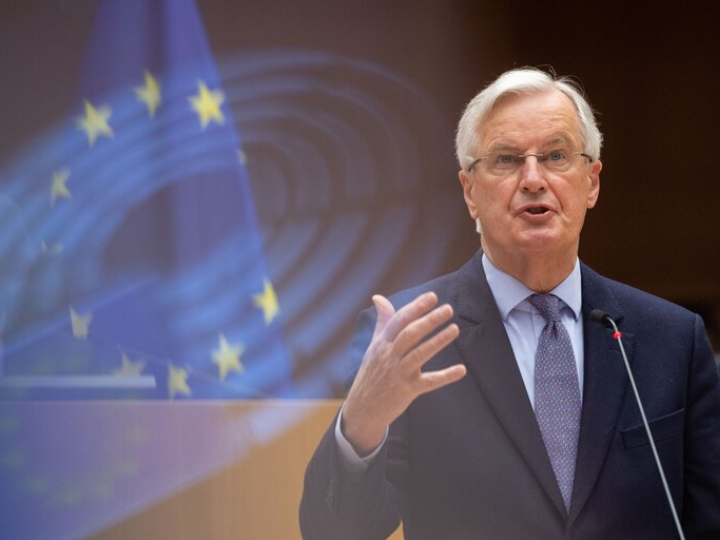by Hugo Struna and Paul Messad
French Prime Minister Michel Barnier reiterated France’s opposition to the EU-Mercosur free trade deal and confirmed his desire to seek a ‘blocking minority’, according to information obtained by Euractiv, dashing hopes of finalising the deal at the upcoming G20 summit in Brazil.
While some media reports pinned hopes on a conclusion of the agreement by the G20 summit in Brazil on 18 November, France and its new Prime Minister, Michel Barnier, continue to oppose it, at least in its current form.
The Mercosur Free Trade Agreement talks began between the EU and Mercosur countries of Argentina, Brazil, Paraguay and Uruguay in 1999 and was agreed on in principle in 2019, although never ratified. Involving a population of over 780 million people, the deal would eliminate some 93% of EU tariffs, making it the EU’s largest trade deal to date regarding tariff reduction.
Barnier and Macron “are in favour of finding a blocking minority to prevent the treaty from being signed”, liberal MoDem MP Pascal Lecamp (Renew), who questioned Barnier directly on the issue on Wednesday (11 September), told Euractiv.
Finding a way to block the signature is “a priority” for Barnier, who is “very attached to the mirror clauses”, Lecamp said about France’s long-standing red line to ensure South American countries are bound to similar trade-burdening rules, such as those related to agriculture or the environment.
The agreement is “double-locked”, right-wing Les republicains MP Antoine Vermorel-Marques (EPP), a close associate of Barnier, told Euractiv.
With a blocking minority, the negotiating mandate given to the European Commission on behalf of member states could be revoked, economist and co-leader of the French Stop CETA-Mercosurs collective Maxime Combes told Euractiv.
Barnier’s suggestion of a blocking minority “is an evolution of France’s position, as [Emmanuel] Macron has never expressed it in this way”, Combes added.
20 years of blockades
France previously blocked the deal in protest of then-Brazilian president Jair Bolsonaro’s deforestation policy, and France did not budget in its request for mirror clauses following the election of socialist President Lula at the end of 2022.
Things have progressed, however, as the Brazilian government reported “significant progress” in meetings with its European counterparts last week and is considering concluding negotiations “before the end of the year”, Reuters reported.
On the EU side, 11 countries, including Germany and Spain, have sent a letter to the European Commission asking it to speed up discussions, the Financial Times revealed on 6 September.
Opponents to the deal, led by French farmers, have since been up in arms, calling on the French executive to take action.
France’s weak position
Ultimately, “the question is not so much what the French executive position is, but whether he is capable of putting it forward”, Lecamp, who initiated a parliamentary resolution against the deal that French lawmakers eventually adopted, told Euractiv.
However, France’s bargaining power in the EU and internationally appears to have been damaged by the political crisis that followed July’s legislative elections. With no party holding a majority in parliament and Macron’s supporters coming second in the elections, the French leader took 60 days to appoint the right-leaning Barnier.
“What is [Emmanuel Macron] going to do given the weakened state he is in?’ scoffed an EU official quoted by Le Figaro.
Still, it is possible “that the EU will not move forward without [France],” said Vermorel-Marques, adding that Barnier will seek to form a “blocking minority”.
What does a blocking minority imply?
Although a blocking minority is possible, EU rules mean that ratification of a free trade agreement such as the EU-Mercosur deal requires a unanimous vote in the EU Council and the green light from national parliaments.
In practice, the EU Commission could split the agreement to isolate the trade chapter (95% of the agreement) and only need the EU Parliament and the Council to vote on it by qualified majority – a scenario that may not play out in favour of the deal.
“For the time being, 11 countries have clearly come out in favour of the agreement, which is both a lot and few, as we are a long way from a qualified majority”, Combes explained, referring to the qualified majority needed for a vote, which requires 15 member states representing 35% of the EU’s population.
If France continues to stand in the way, as Barnier hopes, it is doubtful that an agreement will be reached at the G20 at the end of November, with the risk of a “diplomatic explosion”, predicts Combes.
In any case, it is “not yet ready to conclude the negotiations, ” which are ongoing, ” the EU Commission’s spokesperson told Euractiv.
*first published in: Euractiv.com




 By: N. Peter Kramer
By: N. Peter Kramer
